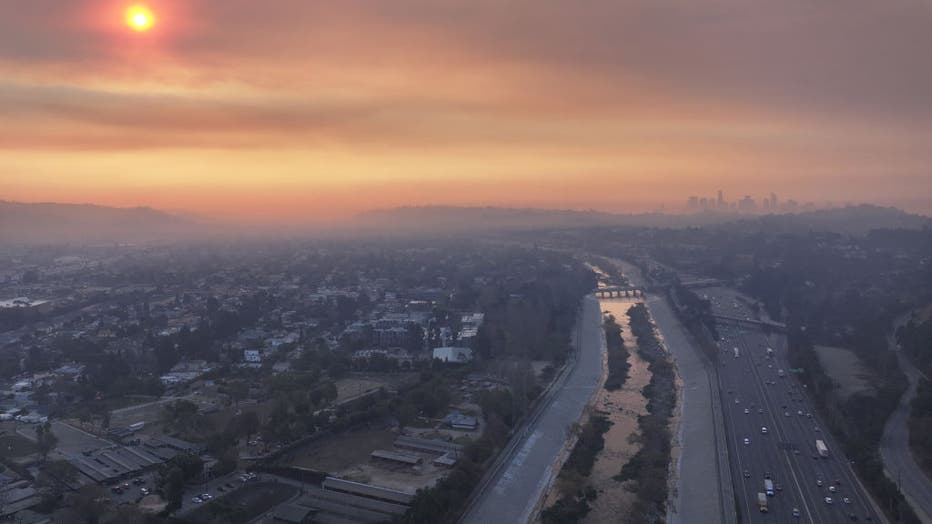Air Quality Alert extended in LA County amid wildfires
Free N95 masks available across LA County
Residents can collect free N95 masks at Los Angeles Public Libraries, Recreation Centers, Senior Centers, and through local nonprofit organizations.
LOS ANGELES COUNTY, Calif. - As first responders work around the clock dedicated to containing multiple wildfires and keeping communities safe, officials are warning Angelenos to protect themselves from lingering poor air quality.
Due to harmful levels of windblown dust and ash, the South Coast Air Quality Management District (South Coast AQMD) extended an Air Quality Alert. The latest alert remains in effect through 7 p.m. Wednesday, Jan. 15.
With another surge of fierce Santa Ana winds, residents were asked to remain vigilant.
Health officials warn of poor air quality
Dr. Anish Mahajan spoke of poor air quality dominating the LA skies and how Angelenos can protect themselves.
Officials said when it comes to poor air quality, the following communites are areas of concern:
- Burbank
- Glendale
- Santa Monica
- Torrance
- Long Beach
- Downtown LA
- Inglewood
- Beverly Hills
- Downey
- Norwalk
- West Hollywood
- Pasadena
- San Gabriel
- Pomona
- Malibu
- Palos Verdes Hills
- Santa Clarita
- Newhall
- Valencia
- Reseda
- Woodland Hills
- Northridge
- Areas along the Highway 14 Corridor

In an aerial view, wildfire smoke hangs over downtown Los Angeles amid poor air quality. (Photo by Mario Tama/Getty Images) (Getty Images)
Ways to protect yourself from poor air quality
LA County health officials also recommend the following:
- Limiting time outdoors.
- Keeping indoor air clean by closing windows and doors.
- Using air conditioners to filter out harmful particles.
- Wearing N95 of P100 masks when outdoors in smoky conditions.
- Those without air conditioning in warm conditions are encouraged to visit a library or shopping center to stay cool and away from harmful air.
- Avoiding the use of fireplaces, candles and vacuums.
- Cleaning dusty surfaces with a damp cloth.
- Those who experience symptoms like severe coughing, shortness of breath, wheezing, chest pain or unusual fatigue should contact their doctor or go to urgent care. For life-threatening symptoms, call 911.
Click here for more information on ash clean-up and food safety instructions.
Recommendations for pets:
- Avoid leaving your pets outdoors, particularly at night. Pets should be brought into an indoor location, such as an enclosed garage or a house.
- If dogs or cats appear to be in respiratory distress, they should be taken to an animal hospital immediately. Symptoms of respiratory distress for dogs and cats include coughing or gagging, difficulty breathing, including open mouth or increased noise when breathing (asthma like symptoms) . Symptoms for cats are less noticeable.

